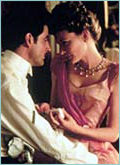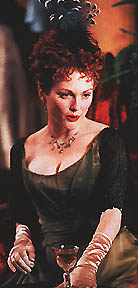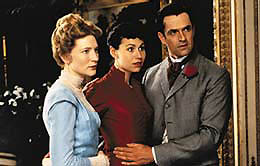![[safe]](safe.gif)

An Ideal Husband

Starring Cate Blanchett, Minnie Driver, Rupert Everett,
Julianne Moore, Jeremy Northam, Jeroen Krabbe
Directed by Oliver Parker
![[safe]](safe.gif)


Why, oh why, does Oliver Parker insist on adapting classics for the screen? It's not that he's a terrible writer or director - it's worse. He's an indifferent, sometimes incompetent one. In his adaptation of "Othello", his scrupulous paring down of Shakespeare's work ensured precious little for Irene Jacob's Desdemona to do, and his lacklustre direction made the usually magnetic Laurence Fishburne an almost boring actor to watch.
 Now, in plundering Oscar Wilde's play of the same title,
he's managed to make Wilde's witty bon mots sound
thunderously heavy-handed and almost mundane. Parker's
direction is about as subtle and light as a sledgehammer,
and he's almost managed to suffocate the inherent hilarity
of the ridiculous situations all of Wilde's characters find
themselves in here.
Now, in plundering Oscar Wilde's play of the same title,
he's managed to make Wilde's witty bon mots sound
thunderously heavy-handed and almost mundane. Parker's
direction is about as subtle and light as a sledgehammer,
and he's almost managed to suffocate the inherent hilarity
of the ridiculous situations all of Wilde's characters find
themselves in here.
The story is a confectionary piece. Sir Robert Chiltern (Jeremy Northam) is an upstanding parliamentarian, known for his moral uprightness and his good character. His wife, Lady Chiltern (Cate Blanchett), is the paragon of virtue who expects the highest standards of those she loves. She, however, is inclined to lower her lofty standards in favor of the idle but charming fop, Lord Goring (Rupert Everett), Robert's old friend and an old flame of hers. Into this cloistered social circle, which includes Mabel (Minnie Driver), Robert's younger sister who is smitten with Goring, enters the suspiciously mysterious Mrs Cheveley (Julianne Moore), a flaming redhead with evil on her mind. Mrs Cheveley has a cunning blackmail scheme in mind - she imposes on Robert to speak for a shady canal deal in which she has invested millions or face ridicule for a past indiscretion to which she holds evidence. Robert, torn between his morals and his love for his high-minded wife who sees him as an "ideal husband", and protecting his political future, enlists Goring's advice and aid. The ensuing drama unfolds as a comedy of manners and pratfalls as Goring - once called the idlest man in London - proves himself a man of courage and morals afterall.
As screenwriter, Parker has adapted Wilde's play in a
bizarre fashion - he has removed Mrs Cheveley's
come-uppance and pumped up the romance between Mabel and
Goring, and interjected a somewhat silly speech for Robert
 in Parliament. All of his efforts only go to subvert the
text's inherent timelessness and makes it seem rather
pedestrian and rooted in its times. He is also guilty, as
director, of bludgeoning his audience with obvious humor
and pratfalls rather than relying on the text to elicit
knowing laughter and cynical smirks. On both counts, Parker
has failed in his attempt to bring to life Wilde's work.
in Parliament. All of his efforts only go to subvert the
text's inherent timelessness and makes it seem rather
pedestrian and rooted in its times. He is also guilty, as
director, of bludgeoning his audience with obvious humor
and pratfalls rather than relying on the text to elicit
knowing laughter and cynical smirks. On both counts, Parker
has failed in his attempt to bring to life Wilde's work.
His cast, however, is quite another story. Working without the aid of competent direction, the ensemble makes this film watchable, while reminding us of the wonderful possibilities if only a more competent helmer had been calling the shots.
In a cast full of my personal favorites, Jeremy Northam
stands out for an impassioned, fully believable portrait of
a man at cross purposes. Cate Blanchett manages to breathe
life into the stuffy role of the good matron, while Minnie
Driver does her best not to over-do her series of reaction
shots. Julianne Moore is sumptuous and tantalizing as the
cunning villainess, and Everett finds the right note of
boredom and glee in his line readings to make well known
phrases sound fresh and winning. They are the only reasons
to watch this trifle.